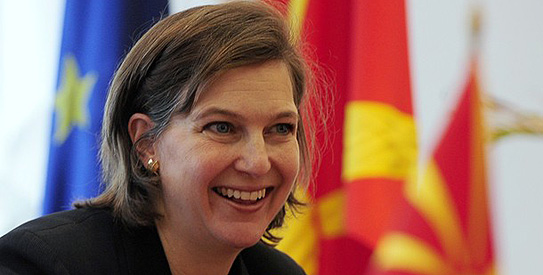
WASHINGTON: The US State Department rejected on Thursday President Asif Ali Zardari’s claim that it was propping up ‘tailor-made’ democracies in the Middle East, insisting that democratic movements in that region were indigenous and these people were only demanding the rights denied to them by their rulers.
President Zardari had criticised US policies in the Middle East in his speech in Larkana on December27, although he never named the United States.
As expected, excerpts from his speech were read at the first State Department briefing since Tuesday and journalists reminded the department’s spokesperson Victoria Nuland that Mr Zardari had chosen his wife’s death anniversary to criticise the United States.
Journalists read out the portions where Mr Zardari said he was not going to join the theatre of war in Afghanistan, he would not abandon the Iran gas pipeline and that the US was propping ‘tailor-made’ democracies in the Arab world to show that democracy eventually would fail.
“I haven’t seen what was said ... so I’m not in a position to comment directly on it,” said Ms Nuland. But “more broadly on the question of democracy movements in North Africa and the broader Middle East, I don’t think anybody should question that these are grassroots, indigenous movements by people who have long wanted more freedom than their government allows; have wanted what Pakistanis have, which is the right to elect their government,” she added.
When a journalist asked her to comment on Prime Minister Yousuf Raza Gilani’s statement in the parliament that intelligence agencies were running “a state within the state”, Ms Nuland reminded him that he was trying to draw her into “internal Pakistani things” and she was not going to do that.
Another journalist referred to a statement the foreign ministry in Islamabad made on Thursday, acknowledging that 2011 was a bad year for US-Pakistan relations.
“What are you looking at in the year ahead?” the journalist asked. “I don’t think anybody on any side would question that 2011 was a difficult and complex year in the US-Pakistani relationship,” the State Department official said.
“Obviously, what we want to do is turn the page, redouble our efforts to cooperate against the threats that we share, and to support a strong, prosperous, democratic Pakistan in an increasingly stable, peaceful, prosperous, democratic region.”
“There is a feeling in Pakistan that the US has been criticising Pakistan too much, on too many issues, which prevented the civilian and the military leadership from overcoming issues like the November 26 air strikes,” said the journalist while asking her how the US planned to deal with this perception. “As you may know, we put a huge amount of effort both from our embassy in Islamabad and our consulates in Pakistan, as well as from this podium and the secretary’s travels, to try to speak directly to the Pakistani people, to talk to them about the interests that we share, to make clear how much the US government is trying to support the development of a strong, stable, peaceful Pakistan free from terrorism, internally, free from being a platform for terror,” Ms Nuland said.
“You know, we put a huge amount of US taxpayer money every year into education programs in Pakistan, micro-lending programs, flood relief, all kinds of economic opportunity programs because we believe a strong Pakistan is in our interests.”
The US, she said, would continue to try to give that message directly to the Pakistani people, as Secretary of State Hillary Clinton did herself in her town hall meeting and in her TV interviews when she was in Pakistan in October.
“We believe that that message needs to be conveyed strongly in Pakistan by Americans and by Pakistanis. But we need each other and that we have a lot of work still to do to build the kind of neighbourhood there that it is in our mutual interests.”
Another journalist noted that in 2011, India and Pakistan held several rounds of direct talks and asked if the US had played any role in arranging these talks. “We’ve long encouraged direct dialogue between India and Pakistan. That we are encouraged that on this front 2011 was a good year, that they made considerable progress together. And we want to see that progress deepened and strengthened in 2012,” Ms Nuland responded.














































Dear visitor, the comments section is undergoing an overhaul and will return soon.